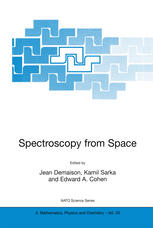

Most ebook files are in PDF format, so you can easily read them using various software such as Foxit Reader or directly on the Google Chrome browser.
Some ebook files are released by publishers in other formats such as .awz, .mobi, .epub, .fb2, etc. You may need to install specific software to read these formats on mobile/PC, such as Calibre.
Please read the tutorial at this link: https://ebookbell.com/faq
We offer FREE conversion to the popular formats you request; however, this may take some time. Therefore, right after payment, please email us, and we will try to provide the service as quickly as possible.
For some exceptional file formats or broken links (if any), please refrain from opening any disputes. Instead, email us first, and we will try to assist within a maximum of 6 hours.
EbookBell Team

0.0
0 reviewsMany satellites have recently been launched or are in preparation, which operate in the microwave to IR ranges, the main objective being to observe the earth's atmosphere or interstellar clouds. Analysis of the data they supply requires extensive laboratory work because we still only have sufficiently accurate data (line positions, intensities, and profiles) for only a few species. Furthermore, the observer community is making increasing calls for laboratory data, as new development open up new observational possibilities (such as submillimeter observation). Research on these subjects involves many different areas of specialisation in fields of research that generate a wealth of data.
In Spectroscopy from Space the people responsible for field observations explain which results they are expecting from their measurements and how laboratory people can help them to analyse their satellite data. Laboratory spectroscopists explain why what they can do now, and what kinds of experiment and theoretical development that might undertake to meet the needs of the remote sensing community. The problems of distributing reliable laboratory data in a timely way are also addressed.